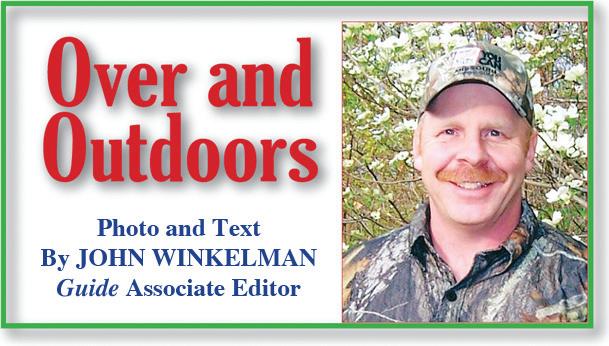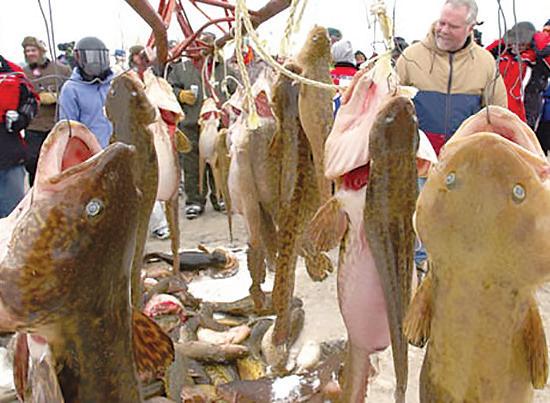
30 minute read
So long, Joel Vance
By BRANDON BUTLER Driftwood Outdoors
One of the most important conservation voices in Missouri history has gone silent, yet his words will live on forever. Joel Vance passed away Dec. 9. His work as a writer for 50-plus years inspired generations to enjoy the natural resources of Missouri and beyond.
He leaves a legacy as a legendary communicator that will stand the test of time. Vance is best known for his time spent with the Missouri Department of Conservation.
Vance’s family released the following statement:
“Joel M. Vance passed away peacefully after a short hospital stay. We all got to see him to say our goodbyes in the ICU. He is no longer hooked up to machines. He is striding through an eternally sun-dappled quail field, strong and vibrant once again, a brace of favorite Brit-
By JIM LOW
Missouri Outdoor
Communicators
By now, most of you know that one of the most powerful voices for conservation has fallen silent. Joel M. Vance, treasured friend and mentor to tanies, Dacques and Chubby long gone, crisscrossing ahead through the fallen leaves.
“His hand is no longer cramped by stroke; he can pick Doc Watson tunes on his Martin guitar, and his song is pure, voice no longer crackling with age. His fingers fly across the keys; he no longer has to use his voice recognition software to share his insights with his readers. If you read his blog, you’ll know that a release from his concerns about the country that he loved soothes his soul. We’ll miss him. His readers will miss him.”
ACCOLADES FOR VANCE
Vance’s outdoor writing is recognized far beyond the borders of his beloved Missouri. He served as president and board chairman of the Outdoor Writers Association of America (OWAA). He is also one the very few writers to have won three of the generations of outdoor communicators, died peacefully on Dec. 9. If I remember right, he was 86.
I am honored and daunted by having been asked to write a remembrance of Joel for MOC Talk. His career, like his personality, was outsized.
Joel Vance was a gifted outdoor writer who covered Missouri for 50-plus years.
Outdoor Writers Association of America’s major awards: Excellence in Craft for journalistic excellence, the Jade of Chiefs for adherence to and support of the principles of conservation and the Ham Brown Award for outstanding service to OWAA.
Jim Low, who succeeded Joel as a writer for MDC, said, “Joel became a familiar and trusted presence in hundreds of thousands of homes where It would take a book to do justice to his legacy. What I know best about Joel is how he affected me. So I’ll stick to that and trust that what I saw of Joel is representative of his life.
Like most of you, my first exposure to Joel came subscribers to Missouri Conservationistmagazine watched for his byline. The literary rapport he built with millions of readers came into play when he wrote the entire August, 1975, issue of the Conservationist, explaining what the agency would do if voters approved the one-eighth of one percent sales tax for conservation. They did approve it, and the stable, dedicated financial foundation it provides to this day has made Missouri the envy of nature lovers the world over. Some U.S. presidents have left legacies less significant.”
IN HIS WORDS
In April 2017, I interviewed Vance for an episode of The Conservation Federation Podcast. It can be found on the CFM website, www.confedmo.org. To wrap up the interview, I asked Vance to give some sage advice to the next generation of Missouri conservationists. through the pages of the Missouri Conservationist. The one thing everyone recognized in Joel was his gift for humanizing any subject. It didn’t matter whether he was describing a quail hunt, profiling a citizen conservationist, explaining why Missouri needed a conservation sales tax or documenting his own misadventures. His prose always brimmed with the warmth and zest for life that were the hallmarks of his own personality. He had the rare gift of being able to “write funny,” as he put it. His humor emphasized human foibles and the slapstick aspect of outdoor misfortunes.
Joel’s contagious love the outdoors and his insights into human nature earned him assignments from all the nation’s top outdoor magazines, not to mention the patronage of publishers. His lifetime literary output ran to the hundreds of thousands of news releases, magazine articles, monthly columns and books. If outdoor gear retailers had donated one ten-thousandth of one percent of sales that were traceable to Joel’s writing, he would have been a multi-millionaire. But acquiring wealth was not his top priority. He was born to tell stories and – after the love of his life, Marty, and their children – that’s what he lived for. Writing wasn’t merely a vocation or even a passion for him. It was akin to breathing. Decades after his “retirement,” he continued to entertain, inform and edify readers. Only the grave could still his restless pen.
FIRST MEETING
My first in-person encounter with Joel occurred while I was attending his alma mater, the University of Mis-
His response was, “Every citizen of Missouri has a stake in the outdoors because it is, in my mind, the number one conservation state in the country and has been for many years. And I think it is almost a duty of every kid growing up, even in the city or country, it doesn’t matter where, to get educated about the outdoors. There are great education programs the Conservation Department has about wildlife. Learn about the outdoors. Read about it. Become interested.”
WHITEHEAD VIEW
Bobby Whitehead, editor emeritus of Outdoor Guide Magazine, said, “Joel Vance was the best outdoor editor I ever knew. He was my longestrunning columnist in the Outdoor Guide. He was tough and didn’t hold back about how he felt. I’ll miss his honesty and heartfelt love and passion for all the people and places that make the outdoors in Missouri souri School of Journalism. I desperately wanted to work for the Conservation Department. To that end, I had earned a bachelor’s degree in wildlife management. But my grades in math, chemistry and physics guaranteed I would never get into a master’s program. I was good with words, so I decided that was my best chance of sneaking in the back door at MDC. One day after classes, I drove to Jefferson City and – unannounced – knocked on his office door.
Looking back, the most remarkable thing about that meeting is that he was there. Joel based his writing less on phone calls and interviews than on personal outdoor experience (a fact that occasionally caused consternation in MDC’s upper echelons). But he was in the office that day, and I introduced myself and told him I wanted to do what he did.
Dozens of established journalists would happily have sacrificed limbs to have Joel’s job. By comparison, I had little to offer, beyond passion and that wildlife degree. Looking at the scruffy wannabe writer in his guest chair, Joel might have decided so special.”
Jim Low, who is one of the most thoughtful outdoor communicators I have ever had the fortune of knowing, admired Vance and cared about him in a special way. Following in his footsteps, Low came to appreciate the work and life of Vance in a way most never could.
Low said, “Writing was always more than a vocation or even a passion for Joel. For him, it was akin to breathing, and continued until the grave claimed his restless pen.”
We should all be so lucky to live a life as full as the one Joel Vance just left behind. Missouri is a better place for having had Vance telling her stories of beautiful places, wonderful people and a conservation ethos without parallel for so many years.
For more Driftwood Outdoors, check out the podcast on www.driftwoodoutdoors. com or anywhere podcasts are
A great voice for conservation has fallen silent
OUTDOOR January-February 2021 GUIDE
MAGAZINE
HUNTING • FISHING • CAMPING • BOATING • SHOOTING • TRAVEL
Volume 29, No. 1 • Published six times a year Office: 505 S. Ewing, St. Louis, MO 63103 News department — 618-972-3744 www.outdoorguidemagazine.com e-mail: news@outdoor-guide.com
COVER created by Kathy Crowe, graphic designer.
Carl Green, editor – carl@labortribune.com Bob Whitehead, editor emer. – ogmbobw@aol.com Kathy Crowe, graphic designer John Winkelman, associate editor — ogmjohnw@aol.com Lynn Fowler, circulation manager
— Account executives — Dan Braun, marketing director 314-256-4136 Lauren Marshall 314-256-4141
Darrell Taylor Ray Eye Brent Frazee Brandon Butler — Regional and specialty editors —
Curt Hicken Bill Seibel
Bill Cooper John Neporadny Jr.
Thayne Smith Rick Story
Steve Jones T. J. Mullin Larry Whiteley Ted Nugent Ron Bice
– In Memoriam — Joel Vance • Ron Henry Strait • Jared Billings • Charlie Farmer • Richard Engelke • Mark Hubbard • Spence Turner • Hank Reifeiss Kay Hively • Bill Harmon • Barbara Perry Lawton • Danny Hicks • Ron Kruger • TJ Stallings • John Sloan
Scott Pauley Tim Huffman John Meacham Bob Holzhei Jeannie Farmer Jerry Pabst Ryan Miloshewski — Staff writers — Claudette Roper Kenneth Kieser Brad Wiegmann Gerald Scott Mike Roux Russell Hively Craig Alderman Roxanne Wilson Randall Davis Gretchen Steele Jo Schaper Larry Potterfield Jed Nadler Tom Watson
streamed.
he was too busy to spend an hour with me. But he didn’t. Instead, he took me under his wing. I came away from the meeting with solid career advice, and I kept in touch during the intervening years. A decade later, when Joel quit his job (predictably, over a matter of principle), I had the unimaginable good fortune to take up his mantle.
For all that, I was not particularly special. Go to Joel’s Facebook page and read the hundreds of comments following his death notice, and you will discover that he mentored scores of aspiring communicators over the years. Many of those adoring fans went on to become luminaries in their own rights. Joel wasn’t merely patient with young people who shared his passions. He became their friend, their mentor and promoter. He was as at ease and collegial with bashful 16-year-old admirers as he was with fellow outdoor legends.
Joel wasn’t perfect, but most of his faults also were among his most endearing traits. For example, he wore his heart on his sleeve to an extent that could be bur-
See GREAT VOICE page 9
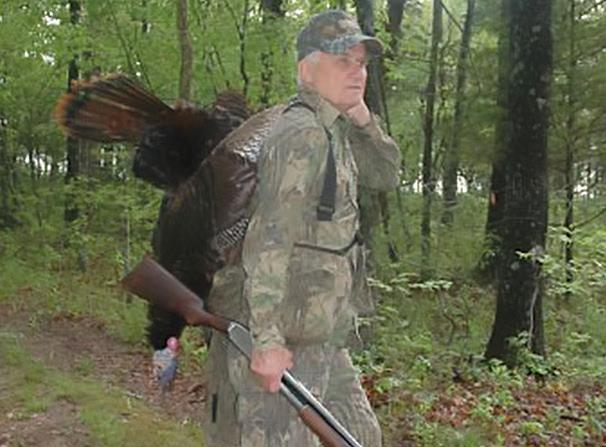
Poachers ruin deer camp experience
Photos and Text By BRANDON BUTLER
Opening weekend of Missouri’s firearms deer season was a disappointment, to put it mildly. Only one of the six hunters in our camp took a buck. The weather certainly did not cooperate. Rain, wind and lighting all impacted our hunting efforts, but it was the brazen, illegal act of poachers that really ruined the experience we had anxiously waited for all year.
Saturday morning found me more than a mile deep in the forest, high upon an Ozark ridge. This same spot has been good to me over the last few years. It’s a long hike in but usually is worth it to experience the solitude and deer encounters. This year was different.
About 30 minutes after daylight, I heard a stick snap behind me. Sure I was about to Guest lay my eyes on a big buck, I was dismayed Editorial to see another hunter working his way down the old logging road I was sitting on.
The nearest access site to this part of the public forest was more than two miles to the east. Obviously, this person had ignored the signs that clearly state motorized vehicles are not allowed. When he saw me, he waved and turned around.
BARRELING DOWN THE RIDGE
To one-up that fella, my heart sank when I heard a vehicle headed my way at a rapid pace. Sure enough, a jeep came barreling down the ridge. I stood up in my stand and waved at them, but they didn’t see me. I guess they were driving too fast.
When they were less than 20 yards from me, I yelled, “Hey!” They stopped, complained about how many people were hunting, then turned around and went back the way they came.
Then the dogs started. If you have ever heard the horror stories of packs of hounds running deer through the Ozarks, let me tell you, in some areas it’s worse than you can imagine. It goes on without regard for the fact that it’s both illegal and ruins the hunting experience for the majority of people out in the woods hoping for a deer to wander by.
With hundreds of thousands of acres of public land around, I still had two packs of hounds run through my 40 acres on opening morning alone. From that point on, the hounds were constant. Pickup trucks with dog boxes just casually cruise into the hollow and release their dogs to run the long drainages and ridges.
ONE TRADITION RUINS ANOTHER
The argument is it’s their tradition. Well, it’s illegal for a number of reasons, including the ethics of running deer, but what I’m most concerned with is how it ruins the hunting experience for everyone around who is trying to hunt legally. It ruins our traditions.
I have invested so much time and money in my dream hunting property. I have greatly improved my land’s wildlife habitat. I plant food plots and try to hold deer on and around my place. Then on opening weekend, pack after pack of hounds are released and run everything off. The dogs don’t know property lines and their owners, who do, simply don’t care.
Then the worst of the worst happened. It’s still hard to believe it was real. Four of us were sitting around a campfire on Sunday night. We’d had a rough weekend but were looking forward to the crowds thinning out on Monday. It was around 8:30 p.m., so it’d been dark for three hours. We watched a truck roll down the hill leading into the hollow. It drove past my house and out into a private field about 100 yards off my land. They stopped not 50 yards behind my neighbor’s cabin. This field belonged to a man who recently died, so some may have been aware it was not being guarded.
The field lit up like someone had turned on the lights at Busch Stadium. Before we had time to register what was happening, a shot rang out. Then another. The shooter was so close to us, we could see the muzzle flash. We couldn’t understand how this was happening. They had obviously seen our campfire and knew the lights were on in our neighbor’s cabin. They were overly aggressive in their poaching, with no regard for the two homes within 100 yards of where they were shooting.
A ‘DUKES OF HAZARD’ MOVE
We took off down my hill to confront the poachers as they drove out of the field. They didn’t stop at our urging to do so, instead pulling a “Dukes of Hazard” move to speed up around us and flee the hollow. We don’t know what they killed. We looked for deer and blood in the field but didn’t find anything. It’s a large field. We were all left speechless.
One of the guys in my camp, Nathan McLeod, said, “I don’t want to sound like a big softie, but it hurt my soul. I felt so bad for the deer, I couldn’t even hunt the next day. It just ruined the entire hunting experience for me. It’s like the deer don’t have a chance.”
The endless chasing with dogs, road hunting, and spot lighting after dark eliminates the normal defenses of deer. It makes it hard to want to pull the trigger on one legally, because you know the struggle they live with. For an ethical, dedicated hunter, who loves wildlife and works to improve habitat and further the ethical aspect of deer hunting, it’s heartbreaking to know what we are up against. Especially when they rub it right in your face.
DISAPPOINTING TO VISITORS
Three people in my camp came from Indiana. They each paid $265 for a non-resident deer license, and this is the experience they’ll take home. We bought groceries, gasoline, a motel room, bullets and more supplies locally. Our little camp injected thousands of dollars into the local economy. It makes me so sad to see how little that is valued.
If you face a situation like this, remember, Operation Game Thief allows you to make reports anonymously. The number is 1-800392-1111.
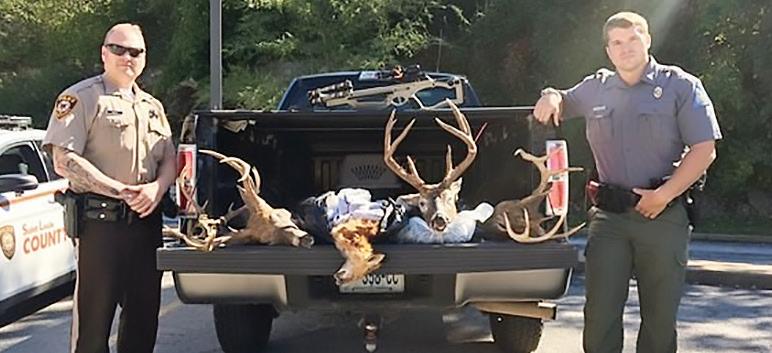
— Random Shots — Never a bad time for a float
Editor’s note: Following Joel Vance’s death (see Page 6), we are running this column in his regular spot as a tribute.
By JOEL M. VANCE
Our kids actually weren’t born in a canoe, but a couple went canoeing before they were born. Our youngest, Amy, was only a month or so from birth when we camped with her on the North Fork River.
On the same river a few years later, she and I turned over in a rapids and she still has vivid memories of bobbing downstream as I held her up and tried to get my footing in the gravel, all the time shouting, “There’s nothing to worry about!”
Of our five children, she is the most reluctant to canoe floater/camp. Wonder why?
But it’s still relatively rare for canoeists to camp overnight on the river. Most are day floaters, out by dusk, which is fine with me. Any time is fine for a family canoe camp, but September is a transition month. Nights turn cool, daytime temperatures are bearable, especially after the tropical brutality of July and August here in the Midwest. Labor Day has come and gone, along with 90 percent of the summer floaters.
ANY TIME IS GOOD
Once, my wife and I canoed with a club from Kansas City on New Year’s Eve on the Current River and had the experience of watching Nancy Jack, a legendary long time Ozark rivers paddler, drift downstream dressed as the new year, oversized diaper and all, while another canoeist exited clad as the geriatric outgoing year. So there is no season out of bounds for a dedicated canoe tripper.
Another time, four of us canoed the Current with our bird dogs, stopping to hunt the bordering fields and fishing for trout as we went. It was about 13 degrees and we got caught in a snowstorm to boot. But we caught trout and found several coveys of quail.
Most states have a guide to their canoe streams. We’ve used guides from Arkansas, Iowa, Wisconsin, Missouri and Minnesota – check with the natural resources or conservation departments. Missouri’s many times reprinted guide, Ozark Wilderness Waterways, now not only contains maps and descriptions of Ozark streams, but also floatable north Missouri streams and rivers. Dr. Oscar (Oz) Hawksley wrote the original version, as well as guides for rivers in other states. Oz, a teacher at Central Missouri State University, probably turned more students onto the outdoors than anyone in the history of the state.
THE MISSOURI BOOK
His Missouri guidebook has a built-in shelf life, because everyone carries it in the canoe and ultimately either by upset or rainstorm, it gets soaked and unusable, requiring the paddler to buy a new one.
The best guide to family canoe camping is common sense. Assuming there are first-time canoe campers wondering how to go about it, here are a few suggestions that should have the force of law: 1. Keep valuables, a change of clothes and bedding in a dry pack that cannot, under the most extreme conditions, leak. A friend once failed to secure his expensive camera and turned over a few feet short of the gravel bar we were camping on, instantly creating a paperweight or possibly a trot line anchor. 2. Tie everything in that you don’t want to watch float down the river, never to be seen again. 3. When in doubt, get out and wade the canoe.I confess that after a half-century of floating together, my wife Marty and I turned over on the Niangua River after I failed to follow my own advice. I lost my sunglasses and she dunked her hearing aids, but miraculously they dried out unharmed. It could’ve been a far more costly incident. 4. If an upset is imminent, jump, fall or otherwise exit the canoe and try to keep it upright. 5. And, in the words of a Wyoming leaflet on grizzly bear encounters, “Don’t panic.”
A SIMPLE DRY PACK
Here’s a simple and effective dry pack: line a rigid-frame hiking backpack with a couple of heavy garbage bags. The frame keeps the bottom of the pack off the wet bottom of the canoe. Valuables go inside the inner garbage bag, which is sealed (twist the top of the bag, double over and tie with a Twist-Em). Then seal the second bag and strap the pack itself shut.
Overkill maybe, but if you’ve never faced a long night in a soaked sleeping bag, you haven’t experienced true misery. My Wisconsin cousins assumed they couldn’t turn over. They sat up all night around a campfire in wet clothes.Coincidentally, even though it was June, the temperature dropped to a record low.My sons and I, dry and warm in sleeping bags, enjoyed a good night’s sleep.
I’ve used .50 caliber ammunition boxes for many years. They store cameras, watches, billfolds, and other fragile valuables. Line them with ethafoam, the hard packing material that protects shipped electronics. Make sure the rubber seal of the ammo box is pliable and tight.And an ammo box is no protection if it isn’t shut when you tip over. Ask my friend who took two Pentax cameras for a swim on the Gasconade River.
STARS BEYOND COUNT
The secret to stability is to balance the weight in the canoe and keep it low. There is no shame in wearing a life jacket, euphemistically called a “Personal Floatation Device.”
I once rescued a youngster who, not wearing a PFD and not able to swim, waded a bit too far into the Current River and was floundering downstream when I did a running dive and fielded him.
Between the dramatic upsets, though, are years of tranquil drifting down Midwestern streams, running the occasional Class One or, at most, low Class Two riffles.
A Coleman lantern casts tall shadows against the dark trees, gargling its familiar sound. The canoes are overturned in case of rain, tents scattered on the flat spots.
The lantern goes out with a pop! And stars beyond count glitter and wink in the dark of the moon. The calling barred owl can stay up all night if it wants, but I’m going to bed.

Rural Ramblings
Winter is the quiet time of the year
By RUSSELL HIVELY
January and February are the winter months of most outdoorsmen and women. It may be time they like to spend outdoors, but fishing is slowed by bad weather and most hunting seasons are over. Still, just the sound of the wind in the bare branches, a cock cardinal bragging to the world, or the glimpse of a doe bounding from your approach are special and worth any outing.
***
If possible, drive the dirt roads of Missouri. Get some mud or dust on that new, shiny pickup and see what nature really looks like.
***
White-ribbon fishing areas of Missouri are popular. They contain trout and many are catch-and-release only in the winter, but they do provide fishing opportunities in the winter months. Newton County, in southwest Missouri has two white-ribbon fishing areas – Hickory Creek, which is in the city of Neosho, and Capps Creek on the eastern edge of the county.
***
Soon the Missouri Department of Conservation will celebrate its 85th anniversary, having begun in 1937.
***
Most outdoorsmen or densome. When something offended his sense of right and wrong or threatened conservation progress, he was prone to jump into the fray with both feet. This trait cost him personally, when cowardly editors bent to advertiser pressure and refused to print his jeremiads canceled his columns.
HIGH NOTES, HIJINKS
Joel also was possessed of a boyish enthusiasm that could get him into trouble. Recognizing that most outdoorsmen fall short of Jack O’Connor and Lefty Kreh, he turned his own misadventures into self-deprecating grist for his literary mill. Nor did he ever lack for maladroit partners to augment his story files. Chief among his partners in slapstick comedy was his beloved quail-hunting partner, MDC’s late trout biologist Spencer Turner. Politically, they were an unlikely pair. Spence was staunchly conservative, the polar opposite of Joel’s politics. But Joel never let that interfere with their friendship. It was just one more way that Joel and Spence’s big spirits showed.
During Joel’s tenure with women are awed when they see a pileated woodpecker. Measuring about 15 inches, it is the largest woodpecker commonly found in the state. Pileated woodpeckers prefer to live in older wooded areas but at times have even been sighted on the lawn of some house in town.
***
Is it true that the most famous woodpecker in the world, Woody, is a pileated woodpecker?
***
Remember the day when you went hunting and saw no game? Or when you went fishing and didn’t get a bite? Not every outing is a success. Even armies have problems. Just remember that the very first bomb dropped by the Allies in World War II killed the only elephant in the Berlin Zoo.
***
Sometimes winter seems to last forever. Did you recall that onion seeds need to be planted in February?
***
Did you ever notice that some old hedge apple trees look like they were planted in a row? If so, they may be from stock planted as hedgerows by the early settlers in the 1850s.
***
When hunting in fall, do
• Great Voice from page 6
you carry an onion in your the Conservation Department, Missouri’s more than 400 newspapers eagerly published his weekly news release package, “All Outdoors,” because it never failed to entertain as well as inform their readers.
My fondest memories of Joel involve bluegrass music, single-malt scotch and marathon story-telling. I picture him now, reunited with Spence and guitar-picking friends who went before him to that big jam session in the sky. We’ll see you by and by, old friend.
When I sat down to write this remembrance, I knew that I could not hope to capture all that Joel was and all that he meant to each of you and to the world. If you have wept while reading this homage, as I have done while writing it, I urge you to send your own memories to MOC Executive Director Kyle Stewart at kyle@tbwgroup. net, so he can share them in an appropriate forum. Joel will not soon be forgotten. Let the remembering and the celebration of his life begin!
Jim Low, now retired, was the News Services Coordinator for the Missouri Department of Conservation.
pocket? You can cut down on the pain of an insect bite by taking a slice of onion and placing it on the bite for 30 minutes.
***
The Missouri Department of Conservation is considering having black bear hunting in the state. Did Missouri once have grizzly bears? If not, why are the two bears on the Missouri state flag grizzlies?
***
Isn’t it nice that sitting in a deer blind can have special events such spotting a flying squirrel, listening to coyotes yelp at each other, or watching a small covey of wild quail feeding?
***
Like the preacher said, “If that doesn’t light your fire, your wood is wet!”
***
Tea experts claim that rubbing tea on the human body can relieve the discomfort of rashes, stings and hemorrhoids. Constant rubbing of tea on the face is also supposed to reduce acne flare-ups.
***
President Eisenhower is given credit for the U.S. Interstate highway system. Perhaps he got his idea back in 1919 when an Army convoy attempted to cross the continental U.S. by road. It took them 62 days. Ike, as a Lt. Colonel, rode for part of the two-month trip.
***
The winter months can keep a hunter or fisherman inside more than he likes, but memories of past fishing and hunting trips can be warming to the heart and soul. At least that’s what this Rural Rambler thinks.
OH THE WEATHER OUTSIDE IS FRIGHTFUL, BUT MY RV IS SO DELIGHTFUL

Connect with Ten of the Area’s Most TRUSTED Family-Owned Dealers.

47 West Trailer Sales 26 Dream Hollow • Troy, MO 63379 636.528.4301
Colman’s Country Campers #2 Fun Street • Hartford, IL 62048 618.254.1180
Apache Village 9001 Dunn Rd. • Hazelwood, MO 63042 877.665.4449
Bill Thomas Camper Sales 101 Thomas RV Way • Wentzville, MO 63385 636.327.5900
Bourbon RV Center I-44 • Exit 218 • Bourbon, MO 65441 573.732.5100
M.B. Thomas RV Sales & Rental 275 Lemay Ferry Rd. • St. Louis, MO 63125 314.631.5600
Middleton’s RV 3441 US-67 • Festus, MO 63028 866.583.7600
Midwest RV Center 6200 Heimos Industrial Park Dr • St. Louis, MO 63129 314.487.8000
Byerly RV Center 295 E. 5th St. • Eureka, MO 63025 800.878.3325
Van City RV 3100 Telegraph Rd. • St. Louis, MO 63125 800.467.3905
By GERALD SCOTT
I like to think I’m as tough as the next guy, and I know I’m more enthusiastic about hunting, fishing or just being outdoors than most people. That said, both my toughness and my enthusiasm are beginning to crumble in the face of the brutally cold temperatures that have descended on our area lately.
Barring a major change, deer probably don’t need to worry about my arrows. I can’t say as much for the rabbits’ need to be wary of shotgun pellets. To paraphrase something my grandfather used to say about quail, you don’t have to sneak up on rabbits in the dark, so my partner and I can confine our hunt to the “warmest” part of day.
But for the most part, I plan on dodging the cold by keeping a wall between me and the weather. After all, there are plenty of outdoor-related activities that can be done indoors.
RIFLE CLEANING
Cleaning rifles has to be my top priority. Given that it hasn’t been dropped in water or mud, a single pass with a bore snake and a quick exterior wipe-down each time it’s used is all the care a smokeless powder firearm needs over the course of the hunting season. But before putting so-called “modern” firearms away for an extended period of time, they need to be disassembled and thoroughly cleaned inside and out.
I hope all of my readers know that any firearm that uses blackpowder or a blackpowder substitute has to be cleaned after it’s been fired even once, and that, if at all possible, this cleaning should be done within 24 hours at most. But what if the firearm was loaded but not fired?
Flintlock and percussion cap rifles can be unloaded either by shooting the round into a safe backstop or by pulling the bullet out of the muzzle and then dumping out the powder charge. In either case, the rifle must be given a thorough cleaning with a solvent specific to the type of powder used.
An inline muzzleloader that
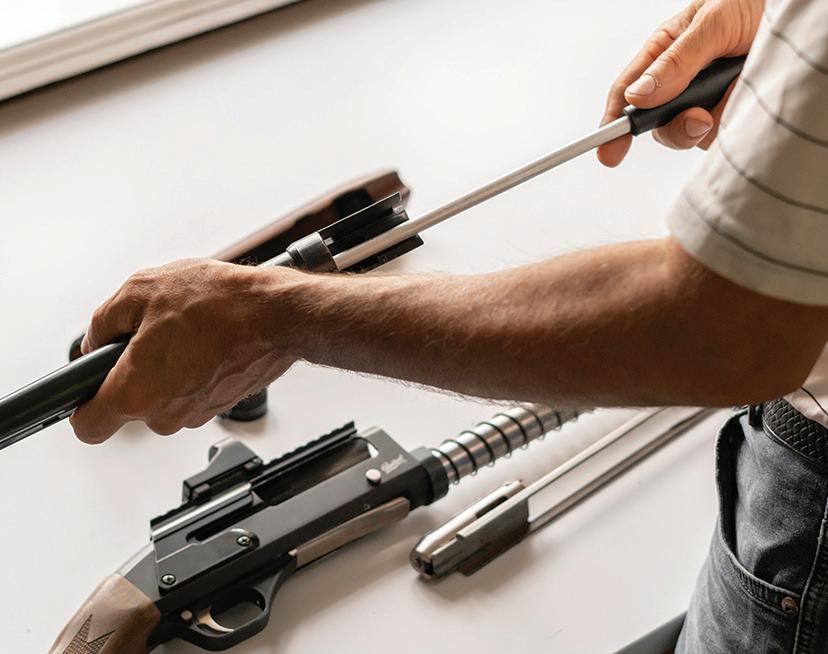
COMING SOON

Powersports Repair (check website for details and updates)
ATV’s UTV’s

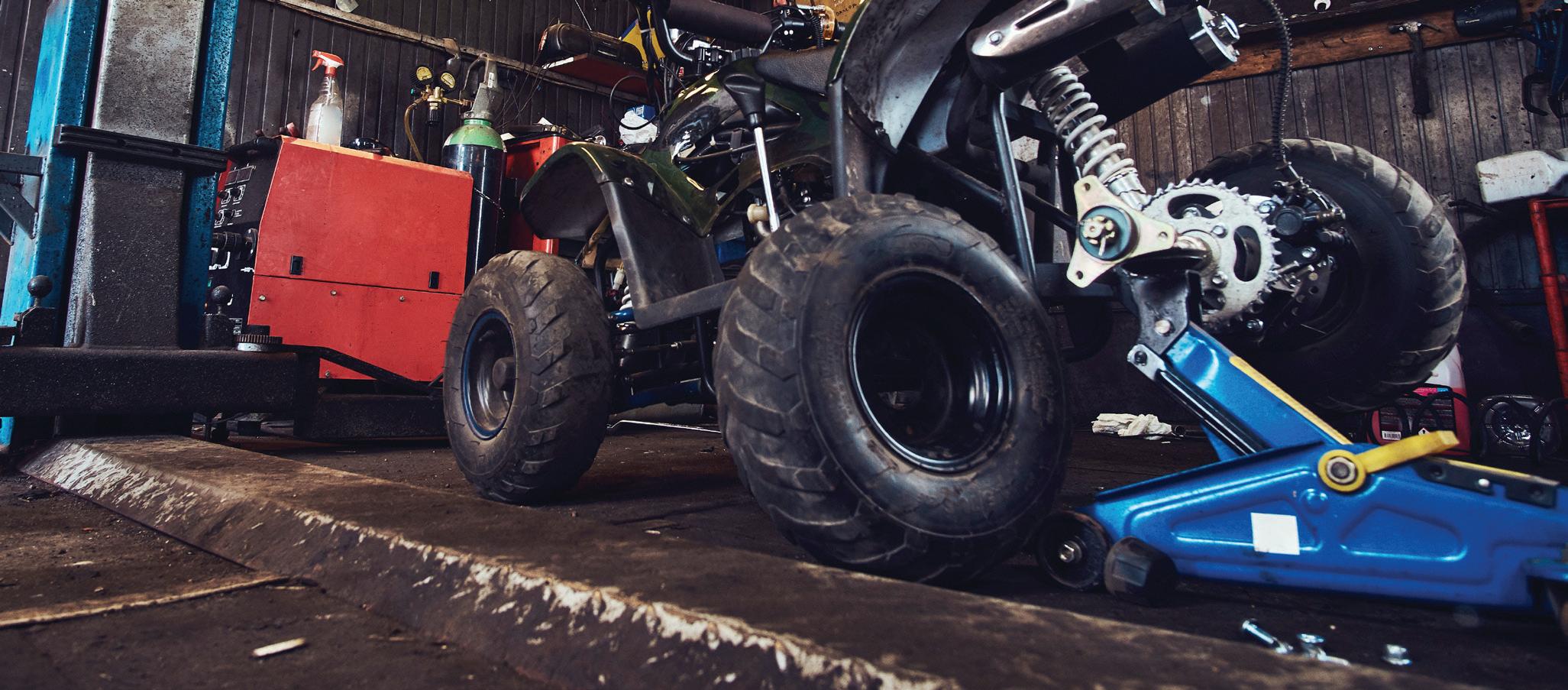
You Can Still Depend on for your RV needs.
Major or Minor Repairs – No job too big or small! Huge Selection of Parts & Accessories!
Inside ~ Outside ~ Top to Bottom We Do It ALL! • Complete Roof Installation • Bearings Packed • Generator Maintenance • Appliance Repairs • Electrical & Plumbing • Body & Paint Work • Insurance & Extended Warranty Claims
If the open hours don’t fit your schedule, Call us. We can make arrangements for drop off & pick up.
Bring Ad in for $10 off Per Labor hour for all Military, Fire and Police. Past & present Expires March 31, 2021


In Business for 16 years!
HOURS: Mon-Fri 8 am - 6 pm • Sat 8 am - 12 pm Office 636.583.2244 | 3rrv.com
7819 HIGHWAY 47 SOUTH | UNION, MO 63084
44 West – Exit 240 – Go North – 1.5 Miles On Left
was loaded but not fired can be unloaded by removing its breech plug, shaking out the powder charge and then ramming the bullet down and out through the breech. Then use a solvent-soaked patch to scrub away the breech plug grease.
Using a clean solvent-soaked patch, clean the lower few inches of the barrel, because this is the only part of the barrel that has sustained contact with either the bullet or the powder charge. Finally, working from the breech toward the muzzle, clean the entire barrel, finishing with a patch moistened with a corrosion-preventing oil. (Author’s note: The definition of “thorough cleaning” is to keep at it until you’re positive the firearm’s clean and then repeat the process.)
RULES OUT OF STATE
Another indoor activity that needs to be at least started as soon as possible is to prepare for an out-of-state big game hunt. If you think you’ll be treated the way out-of-state hunters are treated when they come to Missouri, you’re wrong. I’m not aware of any state with lower non-resident license fees than Missouri.
A few states offer very limited types of non-resident permits over the counter, but Missouri is the only state that offers permits for all of the state’s general deer and turkey seasons to non-residents over the counter.
But be that as it may, with very limited exceptions, if you want to hunt antelope, mule deer, elk, moose, sheep
The Missouri Department of Conservation extended the deadline to Jan. 15 for enrollment in the Missouri Outdoor Recreational Access Program, which provides $15 to $25 per acre and habitat improvement financial assistance to landowners for allowing public access to their land for recreational activities such as hunting, fishing and wildlife viewing.
Landowners can select activities from all-access hunting and fishing, small game and turkey hunting, youth only hunting and fishing, archery or bears, you’re going to have to follow the host state’s rules. This usually means applying for permits and submitting license fees months in advance of the season. The actual issuance of permits will be allocated by a drawing, and all or almost all of the applicant’s license fees are returned if he or she doesn’t draw a permit.
A few states with multiple species of big game have a single application deadline and drawing date, but having different dates for each species is far more common. The Internet has greatly simplified what was once a frustratingly complex process. The wildlife agency of the state you’re interested in should be easy to locate with any search engine. Then “all” you need to do is interpret the appropriate regulations and submit the required fees and paperwork.
BETTER ODDS
Up to a point, units with longer odds of drawing a permit have more public land, more game, more trophy potential or some combination of the three. However, there are ways to swing the odds more in your favor. For example, when I hunt antelope in Wyoming, I choose the muzzleloader season. Due to a relative lack of interest in black-powder hunting, many good units offer a 100 percent chance of drawing a permit.
Let’s face it. When a true outdoorsman has clean guns and a chance to draw a permit for a glamorous out-of-state hunt, will he/she care how cold
Landowner program enrollment is Jan. 15
it is outside? hunting, fishing only, or wildlife viewing. Properties must be at least 40 contiguous acres (5 acres for wildlife viewing or 1 pond acre for fishing only) and at least 20 percent quality wildlife habitat.
The program now has about 50 properties totaling 13,000 acres. Funding is from the U.S. Department of Agriculture; up to 7,500 more acres may be enrolled. More information is on the Department of Conservation website or go directly to mdc.mo.gov/property/Mis-
souri-outdoor-recreational-
access-program-mrap.

